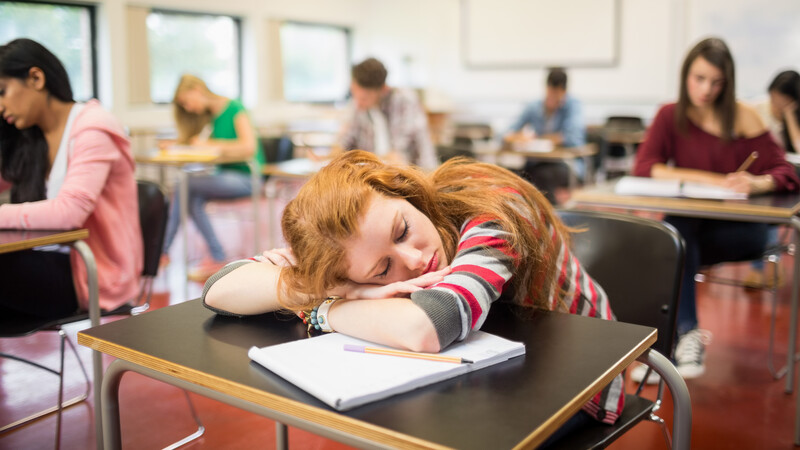The lives of American teenagers have never been more full. With school taking up most of the day, extracurricular activities or jobs stretching into the night, and piles of homework to be done, teens are often the last members of the family to fall into bed and the first to rise. Parents complain about how difficult it is to get their teens out of bed; teachers say students in early morning classes seem to be there in body only and frequently nod off. Some experts believe a crisis of sleep deprivation has arisen among today's adolescents.
Two intrinsic factors affect adolescent sleep. First, as children enter puberty, their sleep habits noticeably change: They begin to stay up later at night and sleep in later in the morning. In the past, scientists have assumed that this pattern results from psychological and social changes occurring during adolescence, such as pressure to study, active social lives, or teenagers' desire to assert their autonomy. But scientists now believe this shift in sleep patterns reflects changes in the brain's biological timing system.
Sleep researcher Mary Carskadon (1999) has investigated the adolescent's circadian timing system, a biological clock that tells the body when and how long to sleep. This system operates by secreting a hormone called melatonin. Melatonin production, regulated by the light-dark cycle, determines when a person gets sleepy and when he or she begins to awaken. Carskadon discovered that the further along teens are in puberty, the later at night melatonin is secreted (this pattern shifts back to normal during adulthood). Adolescents just don't get sleepy as early as they did when they were children. And most teenagers' brains aren't ready to wake up until 8:00 or 9:00 in the morning, past the time when the first bell sounds in most high schools. Teens who have to get up before their internal alarm buzzes miss out on an important phase of REM sleep that enhances memory and learning.
A second factor is the amount of sleep adolescents need. According to conventional wisdom, young children need 10 hours of sleep a night and adults need about 8 hours. Teenagers are usually included in the adult group. But Carskadon has found that teenagers need 9 hours and 15 minutes of sleep to function well and remain alert during the day. This may be because hormones crucial to growth and sexual maturation are released during sleep.
It's clear that teens aren't getting the sleep they need. One survey of the sleep patterns of 3,000 teenagers showed that the majority slept only about seven hours a night, and more than one-fourth averaged only six and one-half hours of sleep or less. Many adolescents try to pay back their sleep debt by sleeping late on weekends, but this can disrupt the normal sleep cycle in the way jet lag affects long-distance travelers.
Consequences of Sleep Loss
The consequences of sleep deprivation include days missed from school, decreased motivation, inattention, and difficulty controlling emotions and behaviors. The more sleep debt teens incur, the greater the harm. One consequence is that the learning curve becomes steeper. In studies, people who consistently slept only six hours each night performed worse on tasks than people who slept eight hours or more each night; people who slept only four hours each night did even worse (Commission on Behavioral and Social Science and Education, 2000). Another consequence is car accidents in which the driver falls asleep at the wheel, which take the lives of more than 1,500 young people each year.
Some school districts are implementing strategies to address teen sleep patterns. In 1996, the Edina School District in Minnesota changed its high school start time from 7:25 to 8:30 a.m. Wahlstrom and Freeman (1997) studied Edina's 7,000 secondary students and 3,000 teachers and interviewed 750 parents. With the later start time, students earned higher academic scores and reported feeling more alert and less depressed. Teachers reported that their students were more alert and interested in their classes.
- Caffeine and nicotine after noon.
- Heavy studying or computer games before bed or leaving a computer or TV on at night.
- Sleeping more than three hours later on weekends.
- Bright light in the evening. Turn on lights as soon as the morning alarm sounds, however, to start the body's waking cycle.

